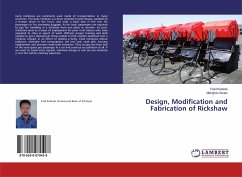Cycle rickshaws are commonly used mode of transportation in many countries. The basic rickshaw is a three wheeled tricycle design, pedaled by a human driver in the front, and with a back seat in the rear for passengers or for conveying luggage. As for taxis, passengers are required to pay for travelling in a rickshaw from one place to another. As such, rickshaws serve as a mean of employment for poor rural citizens who have migrated to cities in search of work. Without proper training and skills needed to get a desired job, those unable to find a better livelihood rent a rickshaw instead, in an effort of making a living. Cycle rickshaws reduce pollution, eliminate fuel consumption, are low cost, road safe, increase employment and promote small scale industries. They occupy less than half of the road space per passenger in a car and produce no pollution at all. If we want to travel more (speed), minimize energy or else we can motorize it, but this will be relatively expensive.








